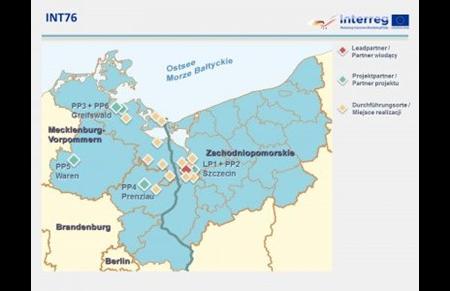What?
Despite the removal of borders between EU Member States, language barriers remain obstacles for deeper integration, mutual understanding, and cultural exchange. To overcome the existing linguistic and cultural barriers, local authorities at the Polish-German border have implemented measures to promote neighbouring language learning among young residents. However, to be effective, these measures needed to be made permanent and continued at all levels – from kindergartens to secondary schools.
The "Neighbourhood language acquisition from daycare to graduation - the key to communication in the Euroregion Pomerania” project aims to turn the above measures into a systematised permanent form of language acquisition. This will contribute to the development of language and intercultural skills in children and young people through games and playful activities. The project seeks to reach about 3,200 students from 53 institutions, 24 from Poland and 29 from Germany, supported by 321 educators and foreign language teachers. Moreover, training courses and workshops are organised for teachers to gain new skills and professional qualifications. The unpopularity of the neighbouring language is one of the main obstacles to the removal of linguistic barriers, therefore, awareness-raising activities and advertising campaigns on the opportunities and advantages of learning the other language will be carried out as well.
This system of continuous acquisition of neighbouring language can only be achieved through a cross-border approach, via an intensive exchange of experiences, knowledge, and teaching models, among partners at all levels. This will be supported by a bilingual e-platform with materials and developed concepts.
Who?
The project is led by the Municipality of Szczecin (Poland). The project partners are all German: the Education Center - Teacher Training Center in West Pomerania, the Mecklenburg-West Pomerania Regional Office for Education, Integration and Democracy, the University of Greifswald, the Gramzow office and two other regional offices. The kindergartens and schools involved can be found here: https://polnischliegtnahe.de/am-projekt-beteiligte-einrichtungen
Where?
The project area is the Pomerania region, of which the Western part is in Germany while the Eastern one is in Poland, and its surroundings.

How
It is co-financed by the 2014 - 2020 INTERREG V-A Germany / Mecklenburg - Western Pomerania / Brandenburg – Poland within the education priority. The ERDF contribution amounts to about €2,200,000. It started in February 2017 and ended in June 2020.
Results
The project goal was to develop children's language and intercultural skills and to break down language barriers by learning and continuously developing foreign language skills up until leaving school. The first success and the growing demand for language learning led to a 2-year capitalisation project, implemented from July 2020 till June 2022. The “Neighbouring language acquisition from day-care centre to graduation - living and learning together in the "Euroregion Pomerania" project was co-financed with about €1,300,000 of ERDF contribution and sought to reinforce and expand the language classes established in the previous years and to carry out training in the field of cross-border teaching. The Polish side focused on a 5-year language learning cycle for those students who had already started an immersive German course.
The project managed to exceed the expected target, as about 3,770 children and students were reached from 57 institutions (24 Polish and 33 German ones) and more than 700 teachers and educators were involved. The web-based teaching programme aimed to bring together Polish and German classes for joint teaching projects. Intercultural training involved not only young people and educators but also parents, in order to attract their interest and raise awareness about the language and culture of the neighbouring country.
In addition to intercultural and social skills, the projects brought about economic benefits, namely a more skilled workforce. Their success will potentially facilitate the access to vocational and higher education as well as access to the labour market of the bordering country, thus contributing to an intensification of cross-border cooperation between target groups and institutions.
All training programs and teaching units are designed in such a way as to be easily replicated in comparable educational institutions in the funding area and beyond.
More information
- Inicie sesión para publicar comentarios
- Etiquetas
- education Multilingualism employment

